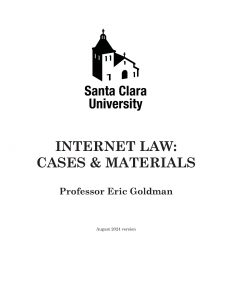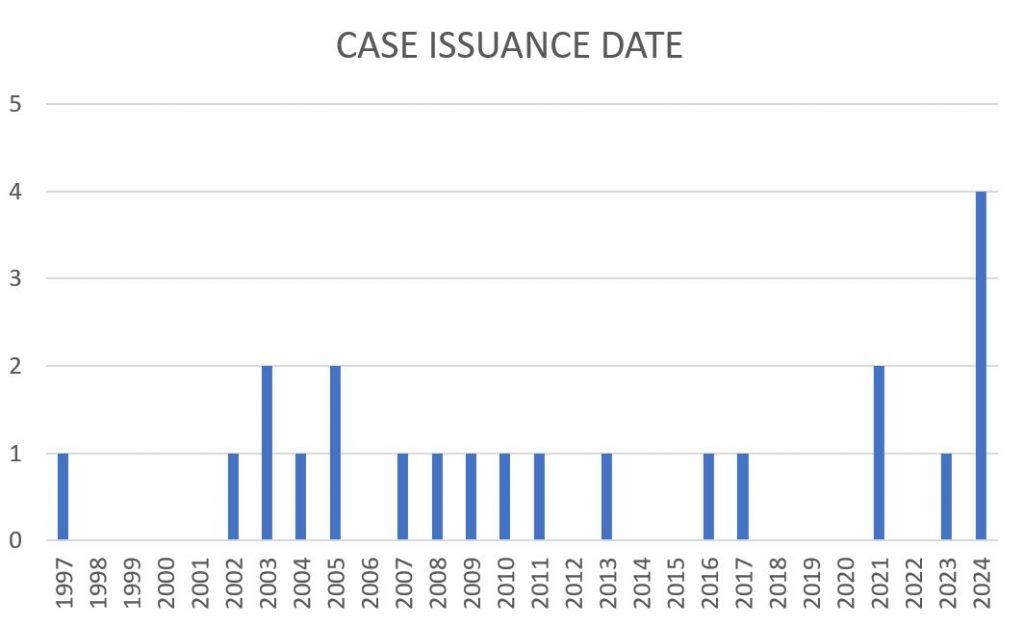Announcing the 2024 Edition of My Internet Law Casebook
 I’m pleased to announce the 2024 edition (15th edition) of my Internet Law casebook, Internet Law: Cases & Materials. The book is available as a PDF at Gumroad for $10, a Kindle ebook for $9.99, a softcover version for $20, and a hardcover version for $28. [All printed versions come with a free PDF on request.] For my thoughts about self-publishing an ebook casebook, see this article.
I’m pleased to announce the 2024 edition (15th edition) of my Internet Law casebook, Internet Law: Cases & Materials. The book is available as a PDF at Gumroad for $10, a Kindle ebook for $9.99, a softcover version for $20, and a hardcover version for $28. [All printed versions come with a free PDF on request.] For my thoughts about self-publishing an ebook casebook, see this article.
If you’re an academic and would like a free evaluation PDF, email me. I can also share my presentation slides. You might also check out (1) my Internet Law course page, which includes 27 years of syllabi and old exams with sample answers, (2) my article on “Teaching Cyberlaw,” (3) my blog post on teaching Internet Law as an online-only course, and (4) my Canvas modules for my Fall 2021 online-only course (I can email my most current ones on request).
* * *
In my ongoing quest to keep the book current, this year I made numerous big (and sometimes heart-wrenching) changes to the book:
* I replaced the principal jurisdiction case. Last year, I took out the Step Two case after 20 years and replaced it with the Herbal Concepts v. PhotoPlaza case. That was a fail. The case was unteachable. I immediately told my students I wouldn’t test them on jurisdiction because I couldn’t teach them a coherent doctrine.
I’ve now swapped out the Herbal Concepts case with the under-the-radar Sixth Circuit opinion in AMB Media v. OneMB, but the AMB case is likely a short-timer as well. I imagine we’ll get more rulings from the Ninth Circuit this year, and I hope they are more coherent than their rulings to date.
* I replaced Harris v. Blockbuster with the North Carolina Supreme Court decision in Canteen v. CMCU. The Harris v. Blockbuster opinion has been a casebook stalwart for 15 years, and it offered a sharp pedagogical point. However, it did involve an edge outcome (the presence of a unilateral amendment clause infected the whole contract) that hasn’t come up often since it was issued. So even though the Blockbuster case teed up the right issues, the literal case holding has waned in importance over the year. The Canteen case frames the issue in a more modern way, plus the “dialogue” between the majority and dissent gives students some back-and-forth to chew on. I will note that the TOS amendment caselaw is moving very rapidly right now, so it wouldn’t surprise me if further casebook changes are coming.
* I redid the Trespass to Chattels chapter mostly from scratch. I took out the Intel v. Hamidi case, a casebook classic for 20 years, as well as the TTC snippet from Register.com v. Verio. It was gutting to remove Hamidi, a wonderful teaching case even though its holding rarely affected subsequent cases.
In their place, I wrote a few thousand new words of explanatory material, revamped the materials to focus on scraping, and added an excerpt from X v. Bright Data on the TTC issue. That case will surely be appealed, so I remain in the market for a good TTC principal case. I did skip some of the interesting but wacky TTC edge cases, such as the Meta Healthcare Pixels ruling, with the hope that subsequent proceedings will be more sensible.
* I added a summary of contributory and vicarious copyright law principles from the Frontier Communications case. Students routinely struggle to understand the interplay between the direct infringer analysis, the principles for secondary infringement, and the DMCA online safe harbor overlay. I hope this excerpt will help a little, but I probably need to do even more on that front in the book in future editions.
* Last year, I added a new chapter on child safety that included discussions about age authentication, parental approval, and “addiction.” I have now taken that material back out. I will be publishing a major revamp of that material in a forthcoming article called “The ‘Segregate-and-Suppress’ Approach to Regulating Child Safety Online.”
In its place, I added a heavily edited version of the Moody v. NetChoice decision. The opinion was 28,000 words and my summary of the case was 10,000 words–both too long to include in my book (which is about 157,000 words total). To streamline the materials, I omitted the facial challenge standards, the mandatory editorial transparency issue, and the concurrences. That left the majority’s discussion on the constitutionality of content moderation, which provides a modern Supreme Court take regarding the tsunami of censorship laws heading for the Supreme Court. With more SCOTUS opinions on government censorship coming imminently, we’ll see how long the Moody opinion stays in the casebook.
* I deleted the Fifth Circuit’s Doe v. MySpace opinion from 2008, another 15-year casebook veteran. The case raised some important discussion topics, but the holding itself was partially limited by the litigation posture. More importantly, the case is increasingly shaky precedent. First, Fifth Circuit undermined its precedential power based on the en banc responses to Doe v. Snap. Second, the growing number of plaintiff wins against social media services (even if just overcoming MTDs), such as the addiction and sexual predation cases, are inconsistent with this ruling. There’s still plenty of material in the Section 230 chapter to tee up the Doe v. MySpace issues if a teacher wants to.
Given all of these changes, it should be obvious why my book is so late this year. My apologies to anyone I inconvenienced due to my delays.
* * *
I have 22 principal opinions in the book. This histogram shows the issuance date of those opinions:
You can see my intentional efforts to modernize the book: 1/3 of the cases are from the last 3 years. But half of the cases come from the 2002-2011 era, though that percentage is shrinking. Blockbuster, Hamidi, Register.com, and Doe v. MySpace were all from that era–all dropped just this year.
I also did a quick calculation of the issuing courts represented among the 22 principal opinions. The Second Circuit leads the pack with 4 opinions. The Ninth Circuit and US Supreme Court both have three. The SCOTUS number includes two from just the past 2 years, and its representation will surely keep rising with the steady flow of Internet Law cases on its docket.
* * *
Over the years, I’ve posted a number of book excerpts, including:
- The entire chapter on online contracts. I posted the 2022 version. The chapter makes a nice module to add discussion about online contracts to another course.
- Primer on CCPA/CPRA (partially deprecated)
- Primer on FOSTA
- Primer on the Copyright Claims Board (CCB) (now deleted)
- Primer on Section 230
- Excerpt on right to be forgotten
- Excerpt on CFAA/Nosal/Power Ventures (now deleted)
- Excerpt on transborder content enforcement
- Excerpt on Brazil’s Marco Civil (now deleted)
- Excerpt on notes about UMG v. Shelter Capital
(Some of the freely available excerpts are dated, but I update all materials that are still in the book).
As always, I invite your comments and questions.
* * *
Table of Contents
I. What is the Internet? Who Regulates It?
Overview
Noah v. AOL (E.D. Va.)
Determining the Geographic Location of Internet-Connected Devices
II. Jurisdiction
Evaluating Personal Jurisdiction
AMB Media v. OneMB (6th Cir.)
III. Contracts
Meyer v. Uber (2d Cir.)
Register.com v. Verio (2d Cir.)
Canteen v. Charlotte Metro Credit Union (N.C. Sup. Ct.)
IV. Trespass/Computer Fraud & Abuse Act
Review: the Computer Fraud & Abuse Act, 18 U.S.C. §1030 [http://www.law.cornell.edu/uscode/text/18/1030], and California Penal Code §502 [https://leginfo.legislature.ca.gov/faces/codes_displaySection.xhtml?sectionNum=502.&lawCode=PEN]
Comparison of Trespass to Chattels Doctrines
X v. Bright Data
V. Copyright
Copyright Basics (Copyright Office Circular 1)
Note About Fair Use
Cartoon Network v. CSC (2d Cir.)
MGM Studios v. Grokster (Sup. Ct.)
Secondary Liability
Review: 17 U.S.C. §512 [http://www.copyright.gov/title17/92chap5.html#512]
Primer on Contributory and Vicarious Copyright Infringement
Overview of Section 512(c)
UMG v. Shelter Capital (9th Cir. revised opinion)
Recap
Ticketmaster v. RMG
VI. Trademarks and Domain Names
Review: 15 U.S.C. §1114 [http://www.law.cornell.edu/uscode/text/15/1114], 15 U.S.C. §1125 [http://www.law.cornell.edu/uscode/text/15/1125], and 15 U.S.C. §8131 [http://www.law.cornell.edu/uscode/text/15/8131]
Trademark FAQs
Trademark Glossary
A. Domain Names and Metatags
Review: ICANN Uniform Domain Name Dispute Resolution Policy [https://www.icann.org/resources/pages/policy-2024-02-21-en] and Rules for Uniform Domain Name Dispute Resolution Policy [https://www.icann.org/resources/pages/udrp-rules-2024-02-21-en]
Lamparello v. Falwell (4th Cir.)
Promatek v. Equitrac (7th Cir.) Original Order and Revision
B. Search Engines
Review: Google’s Trademark Policy [https://support.google.com/adspolicy/answer/6118]
Network Automation v. Advanced Systems Concepts (9th Cir.)
Tiffany v. eBay (2d Cir.)
VII. Content Regulation
Pornography Glossary
Congress’ Early Regulation of Online Pornography
Moody v. NetChoice (U.S. Sup. Ct)
VIII. Defamation and Information Torts
Bauer v. Brinkman (Iowa Sup. Ct.)
47 U.S.C. §230
An Introduction to Section 230
A Note About FOSTA
Zeran v. America Online (4th Cir.)
Lemmon v. Snap (9th Cir.)
Twitter v. Taamneh (U.S. Sup. Ct.)
Top Myths About Content Moderation
Section 230 and Foreign Liability for Third-Party Content
IX. Privacy
Review: 16 C.F.R. Part 312 [http://www.gpo.gov/fdsys/pkg/FR-2013-01-17/pdf/2012-31341.pdf (starting at page 38)]
Excerpts from 16 C.F.R. Part 312, the Children’s Online Privacy Protection Act’s Regulations
Overview of the E.U.’s General Data Protection Regulation (GDPR) and State Consumer Privacy Laws
In re. Pharmatrak (1st Cir.)
X. Spam
Review: CAN-SPAM Act of 2003 [http://www.gpo.gov/fdsys/pkg/PLAW-108publ187/pdf/PLAW-108publ187.pdf] and 16 C.F.R. Part 316 [https://www.ecfr.gov/current/title-16/chapter-I/subchapter-C/part-316]
XI. Social Media
People v. Lopez (Cal. App. Ct.)
Moreno v. Hanford Sentinel (Cal. App. Ct.)
REVIEW QUESTION ANSWERS

